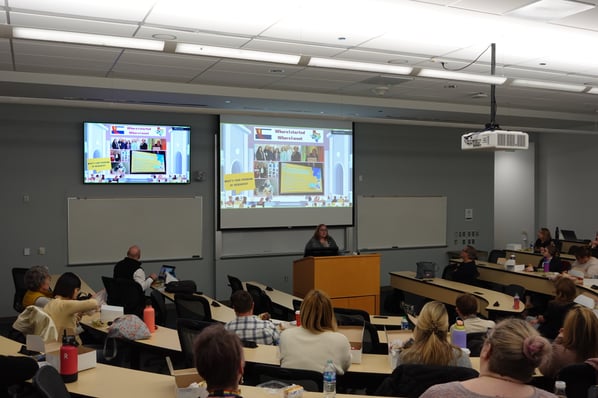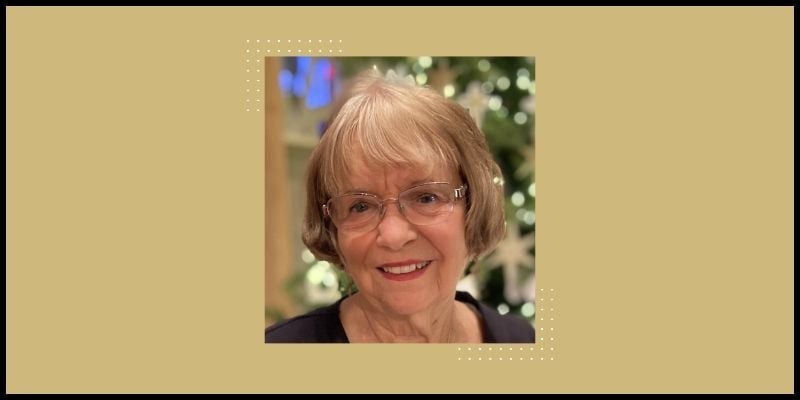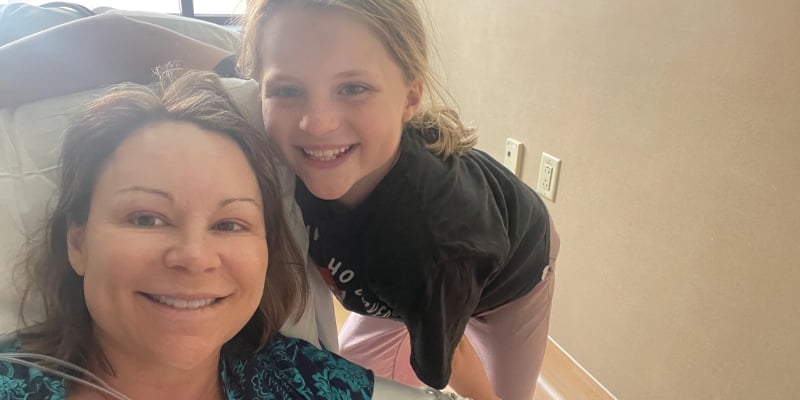Conducting research for a Doctor of Philosophy degree in Nursing can be intimidating. How to do you pick a topic? Where do you start? How do you get it all done? What will the outcome be?
“You may not have started researching yet, so we’re going to talk about developing the story and your area of focus,” Emily Barr, PhD, RN, CPNP-PC, CNM, FAAN, says. “You have to cast your show, pick your collaborators, and set the scene. There are plot twists – because we all have them in life. And, there’s no intermission.”
Barr described the research process in stages – and like producing a play.
The University of Colorado College of Nursing at Anschutz Medical Campus alumna gave a presentation during PhD Intensives Week called “Finding the Silver Linings in Your Research," or "It’s Not Over ‘til You Hear the People Sing”.
Setting the Stage for Your Research
 CU Nursing alumna Emily Barr presents during PhD Intensives Week. |
Barr graduated from CU Nursing with a PhD, focusing on Caring Science. She now works as an assistant professor at the Cizik School of Nursing at UTHealth Houston in Texas.
She focuses on treating young people and pregnant and post-partum individuals impacted by HIV. While developing her research focus as a student at CU Nursing, she wanted to study patient-provider trust in people with HIV and their engagement in care at three sites. But the pandemic hit, so she had to pivot her research aims.
“I met with my two advisers – one of them was (Chair of the Behavioral, Family, and Population Health Division and Professor) Paul Cook – and Paul told me to pay attention. He asked, ‘What’s happening, what’s happening around you?’ So that’s what I did, I looked at what was happening around me right here in Colorado,” she says, while explaining the importance of research collaborations with faculty mentors or casting the show.
Because of the pandemic, Barr shifted her research to studying the effects of telehealth at Children’s Hospital Colorado. She discovered that in 2019 before the pandemic, Children’s Hospital had 75 to 100 telehealth visits per week, or about 20 per day. In March 2020, those numbers jumped to 1,200 a day.
“That’s when Paul told me to pay attention, so I rented an Airbnb in Fort Collins and did six months’ worth of review of literature in a few days,” she says, referencing how to set the scene. “I didn’t really know anything about telehealth, and then by the end of the week, my research proposal shifted.”
Barr calls this a plot twist and reminded students that sometimes data won’t reveal what you think it should – or that it may not be consistent with your hypothesis. She discovered this during her dissertation and again post-graduation while doing a different study in Houston – still related to telehealth and young HIV patients.
Emily Barr's Steps for Outlining Your Research |
|
“One of the things I went back and looked at from my dissertation data was the difference between engagement in-care, your HIV health status, or trust and whether the participant had a nurse practitioner or a physician as their primary HIV care provider,” she says. “We didn’t find a difference in most of the outcomes. This is helpful because you want to show that HIV care with a nurse practitioner will have comparable outcomes to care with a physician. We did find that there was more trust and more visits when an NP was the primary HIV provider.”
The participants in Barr’s study completed surveys about mental health and HIV-related stigma including difficult questions about their HIV diagnoses.
“It makes you feel kind of crummy at the end of filling out a survey like that,” she says. “So, we decided to end the survey by asking about a potential positive outcome of living with HIV.”
Barr asked participants to describe a silver lining about living with HIV. She says all but one of the patients answered the question.
“We have a lot of data on this, and it was sort of surprising. Eighty percent of them said they had a silver lining when it came to living with HIV,” she says. “It’s a small sample size, but those with a silver lining were more likely to have well-controlled HIV, therefore maybe a silver lining actually helped people stay in care and take their medications.”
Barr also reminded students to trust the process. A professor walked into her office one day – during a particularly busy time – and asked her where she sees herself in five years.
“I was like ‘Wow, that’s a loaded question’,” she says. “She walks out of my office and I’m thinking, ‘This is where I can see myself grow', so I got out my sticky notes and wrote down ‘What will you be known for?’ So I think about how I want to be there for a paradigm shift of how we help patients make health care decisions for themselves, including HIV and breastfeeding and vaccine uptake. I want to look at silver linings, study the relational decision-making process and how intellectual humility plays in all of that, and that is really where I see myself.”
Post-Graduation Stay Connected with Faculty
%20at%20May%202021%20graduation.jpeg?width=768&height=1024&name=Emily%20%26%20Jacqueline%20Jones%20(L)%20at%20May%202021%20graduation.jpeg)
Emily Barr with CU Nursing's Jacqueline Jones at graduation in May 2021. |
Barr graduated from CU Nursing in May 2021. She says it’s a great feeling to be back on campus and see the familiar faces of faculty members who helped her through the PhD program. It’s one reason why she came back to campus during PhD Intensives Week to present to current students.
She keeps in touch with several CU Nursing faculty for advice on grants or publications, mentioning Cook, Professor and Assistant Dean of the PhD Program Jacqueline Jones, PhD, RGN, and Assistant Professor Sean Reed, PhD, APRN, ACNS-BC, ACHPN, AHN-BC, FCNS, SGAHN.
“It’s so valuable to have these relationships so I can call someone when I have to make a big decision,” she says. “Paul has been instrumental, if there’s something I want him to review, he’ll review it, Jackie has helped me with research, and I just worked on a paper with Sean.”
Barr says PhD students should follow in her footsteps in staying connected to faculty.
“Don’t avoid meeting with your adviser. It’s important to meet with them and they’ll help you strategize and support your work. They want you to succeed,” she says. “And, when you’re in that place of fear, ground yourself and bring yourself back. Call your best friend. Or Call Paul Cook, he’ll bring you back down to earth.”


